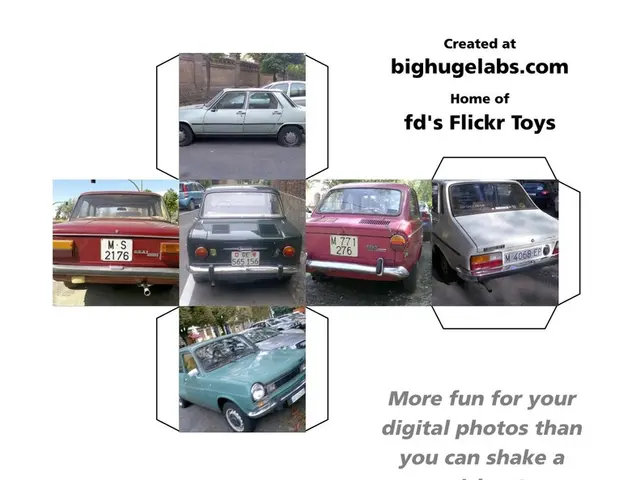Shifting Gears: The Rise of Electric Corporate Fleets in Rhineland-Palatinate - and its Implications
Corporate fleets are finding significant advantages in electric drives, with potential outcomes ensuing. - Electronic drive systems hold significant advantages for numerous vehicle fleets, carrying notable implications.
Companies in the districts spanning Westerwald to South West Palatinate are increasingly embracing electric vehicles (EVs) in their fleets, building internal incentives for the switch. This shift may indirectly influence the number of EVs in private households, establishing a real wave for the electrification.
The pharmaceutical giant, Boehringer Ingelheim, intends to make three quarters of its company vehicles electric by 2030. The transition is gradual, with EVs now the standard for most new orders. More than 100 charging points for electric or hybrid vehicles have been set up at German sites to support this shift.
At the world's largest chemical company, BASF, headquartered in Ludwigshafen, 55% of the company cars are electric or hybrid vehicles. Employees are showing a growing preference for these vehicles, and the company anticipates the trend to continue.
Employees and third-party companies can utilize an electric charging infrastructure built in collaboration with the Palatinate Works at BASF. Financial incentives are also available for the use of electric vehicles in the company's policy.
Dennis Schulmeyer, founder and CEO of Lade, a Mainz-based company, sees substantial incentives for companies to switch to EVs and in-house infrastructure, including power generation. Lade estimates potential savings in Rhineland-Palatinate amounting to up to 249 million euros[1].
The cost of charging an electric vehicle at public charging stations is compared with the cost of diesel fuel in Lade's calculations. It is assumed that an electric vehicle consumes 20 kilowatt hours per 100 kilometers, while a diesel vehicle consumes seven liters.
AI offers the potential for optimization, improving charging strategies by adapting to individual vehicles and using periods of favorable prices.
For companies with smaller fleets, complete solutions may not be as appealing, and AI systems for fleet optimization might be more valuable. An insurance company in Koblenz, Debeka, for instance, has a modest fleet, and savings were reportedly not seen as compelling.
Companies are driving the development towards e-mobility, according to Peter Götting, project leader of the pilot station for alternative drives at the Energy Agency Rhineland-Palatinate. This is particularly beneficial given that company vehicles are usually leased and replaced more frequently.
German manufacturers have made significant strides in the electric vehicle segment, ensuring swift service for fleet vehicles, which is crucial for companies. For companies using their own photovoltaic electricity for charging vehicles, Götting and Lade agree that it's an unbeatable solution.
The impact on the secondary market is significant, as the transition leads to the availability of more used electric vehicles, making the purchase viable for private households. The increased ranges, expanded charging infrastructure, and reduced charging times now speak for adopting electric cars. However, the political back-and-forth in the promotion of e-mobility has slowed down the progress.
In 2024, the share of battery-operated and plug-in hybrid passenger cars in all new registrations in Rhineland-Palatinate was 27%, indicating substantial progress but still leaving room for improvement[2].
The electrification of road transportation is vital, as more than two-thirds of all passenger cars are newly registered with commercial holders, and most commercial vehicles, where significant savings can be achieved, are in company ownership[4].
Even the forestry department of Rhineland-Palatinate is making the switch, aiming to transition its fleet of 400 passenger cars, of which 75 are currently EVs, to electricity sourced from solar panels installed on office buildings and wood solar carports. Although the limited towing capacity and the scarcity of suitable electric vehicles for specific purposes present obstacles, the department aims to be bilaterally climate-neutral by 2025[5].
While specific data on corporate fleets transitioning to EVs in Rhineland-Palatinate is scant, the region's commitment to sustainability, the broader national policies supporting green technologies, and the emerging market for used electric vehicles suggest a favorable environment for such transitions. These developments may accelerate private EV adoption.
[1] Lade, (n.d.). The Costs of Charging Electric Cars - More Details
[2] Energy Agency Rhineland-Palatinate, (2023). E-Mobility pilot More Details
[3] German Federal Ministry for Digital and Transport, (n.d.). National Strategy for the Development of the Automotive Industry More Details
[4] KfW Promotion Bank, (2023). Climate Barometer 2023 More Details
[5] Landesforsten Rheinland-Pfalz, (n.d.). Sustainable Energy Transition More Details
Enrichment Data:
Overall: The transition of corporate fleets to electric vehicles in Rhineland-Palatinate is influenced by several factors:
- Companies' adherence to corporate social responsibility and sustainability initiatives.
- Financial incentives available for using electric vehicles, such as tax incentives and subsidies.
- Increased consumer demand for environmentally-friendly transportation options.
- The expanding charging infrastructure, making it more convenient for corporations and private consumers to own and operate electric vehicles.
- National policies promoting electric mobility, automated driving, and digitalization in transportation.
- In line with their commitment to sustainable living, many businesses in Rhineland-Palatinate are adopting vocational training programs to upskill their employees inrunning electric vehicles and maintaining charging infrastructure.
- The rise of electric corporate fleets in Rhineland-Palatinate has had a ripple effect in the region, leading to an increase in investments in lifestyle-related businesses, particularly those that offer electric vehicle financing options or provide products related to clean technology and renewable energy.
- As more companies transition to electric fleets, there is a growing need for partnerships between businesses and tech startups in the areas of infrastructure development, artificial intelligence, and battery technology, which could foster innovation and spur economic growth in the region.








